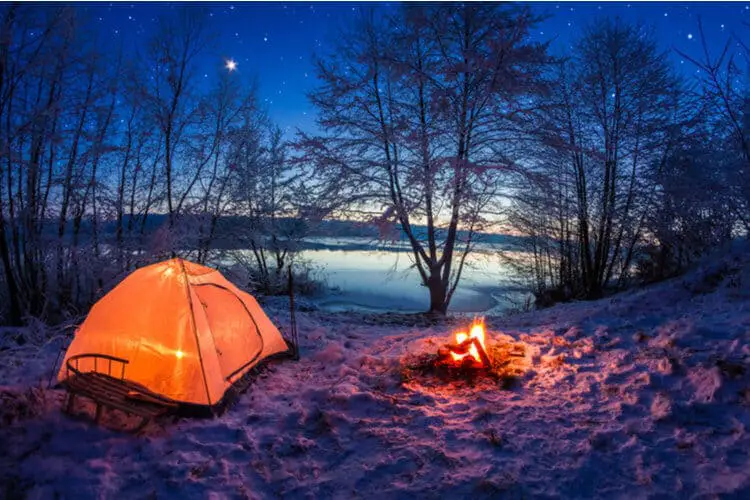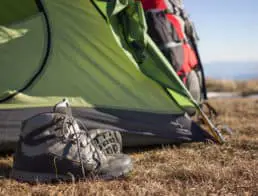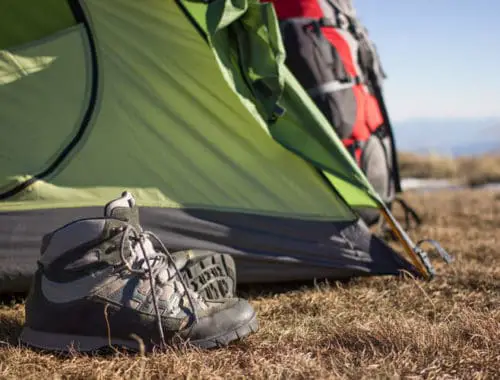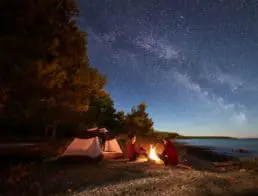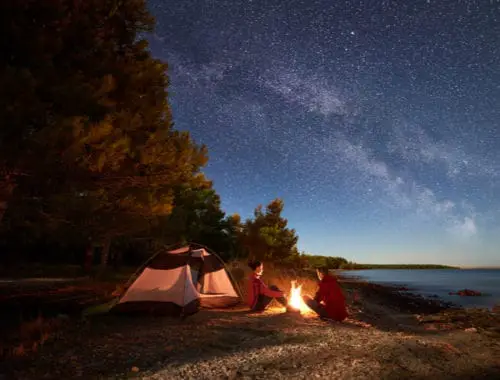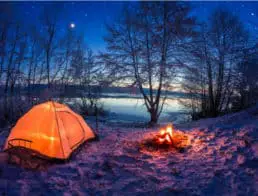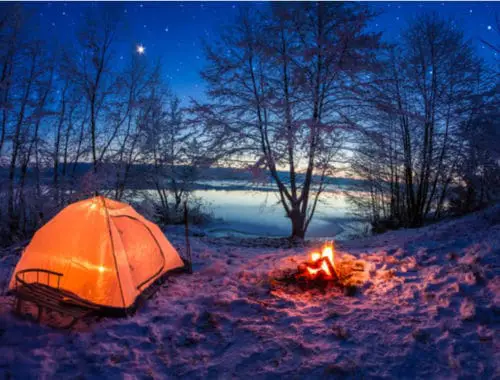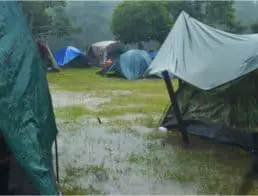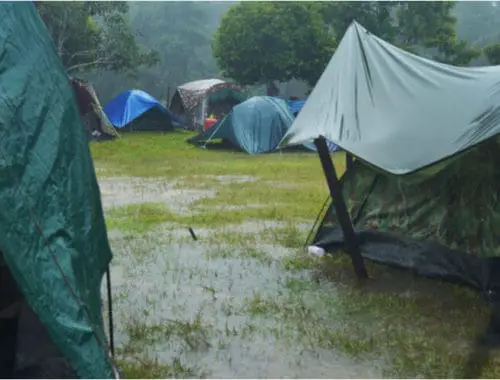Without a few solid cold weather camping tips, beginners can quickly end up in trouble when heading out camping in colder climates. That said, it’s not hard to stay warm in cold weather if you know what to do. With the right gear and technique, you can stay warm in just about any condition (that is, assuming you aren’t planning to spend winter at 8,000 meters in the Himalayas or go strolling around in the Arctic).
Coming from someone who has suffered the effects of frostbite (and has since lost feeling in two of his fingertips) you can rest assured that when I say the cold is no joke, I mean it. That said, I’ve spent hundreds of nights camping and have learned a few tips and tricks over the years to stay warm. So let’s dive right in and break down a few cold weather camping tips.
Remember to Layer
If there’s one thing I see beginner campers forgetting, it’s the importance of layering. Having a warm, technical down jacket is great, but be sure you’re wearing adequate base layers to back it up. Cotton or synthetic long sleeve underwear (both for your upper and lower body) is perhaps the piece of cold-weather gear that is most often eschewed by beginners but does the most work keeping you warm. Be sure you’re not forgetting your long underwear if you’re heading out on a winter camping trip. Over the years I’ve come to value long underwear over any other piece of winter apparel. Layer a light fleece over your long underwear and a down jacket over that, and you’ll be cozy, guaranteed.
Warm Food = Warm Body
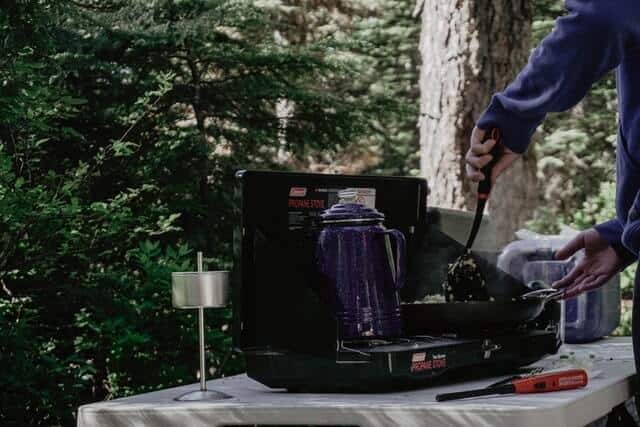
Image courtesy of Unsplash
This brings back memories of one of my first high-altitude treks, climbing the dormant volcano Iztaccihuatl (17,160 ft) in Mexico. The climb was only going to take one night, so my friend and I decided to shave on the weight we were packing in and leave our camping stove at home, opting to eat cold food instead. We packed in a couple of cans of beans, some sausage, and bread, but had no warm food for two days. Camped out at 15,000+ feet with heavy snowfall, that night and the following morning were both bitterly cold. It was the last time I’ll ever make the mistake of forgetting hot food.
When you’re camping in cold conditions, warm food and drink make all the difference. Whether it’s a hot cup of coffee, tea, stew, or even cheap minute ramen, make sure you have some hot food and drink with you (and a way to heat it up) if you’re going to be camping in cold weather. Just be sure you aren’t being careless with the heat.1
Bring Camping Blankets
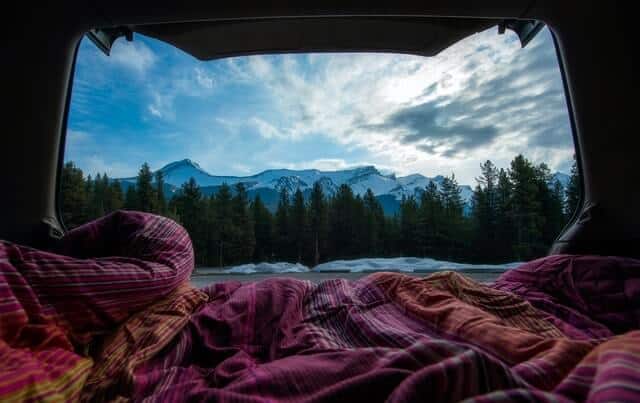
Image courtesy of Unsplash
Traditionally bringing blankets isn’t as feasible when backpacking, but if you’re simply camping in one location and not having to pack your gear in very far, a few camping blankets can go a long way. Not only are the best camping blankets an excellent way to stay warm at night in your tent, but they also work well as ground cloths for a picnic. You can also wrap them around you to keep you warm when sitting outside. Some blankets double as towels and can serve as shade awnings, and more.
The limit to what a quality camping blanket can do is marked only by your imagination, so these days I almost always have one on hand for cold-weather campouts. Many modern camping blankets are compact and packable, too, so nowadays there are some options to take camping blankets backpacking as well!
Protect Your Extremities
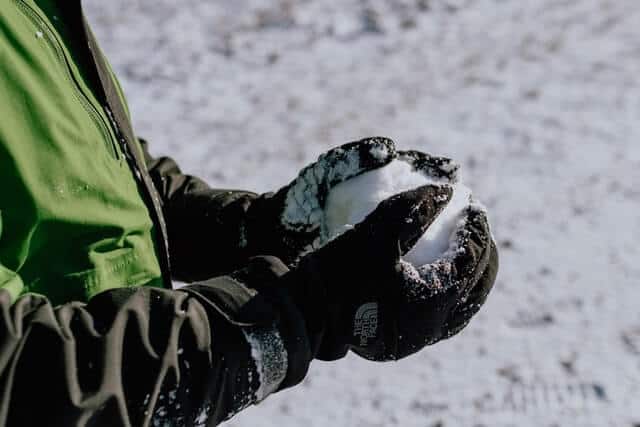
Image courtesy of Unsplash
Hats, gloves, and warm socks are crucial. You lose heat through your extremities much easier than any other part of your body, simply because the skin there is thinner, the blood flow can be weaker, and heat is pulled from the blood more easily.2
Like I mentioned, I suffered the effects of frostbite firsthand (I was wearing gloves, actually, but they were shredded in an accident), so I’m a huge advocate for wearing bombproof gloves, warm hats, and thick socks when out in the cold. Be sure you’re not skimping on any of these three items, no matter how tough you think you are.
Stay Hydrated
Dehydration isn’t just a threat during hot, sunny weather. Winter dehydration is a real thing, and it’s just as dangerous, if not more so. This is because staying hydrated during the summer is often much easier than staying hydrated in winter.3 During cold weather, we tend to get less thirsty, causing us to drink less water. We also sweat less in winter. Our bodies still lose moisture, we just aren’t sweating so it’s harder to be cognizant of that moisture loss and drink enough water to alleviate it.
An adequate daily fluid intake is around 3 liters of water for men and 2 liters for women.4 An easy way to measure that out is via standard Nalgene water bottles. One Nalgene is one liter. Of course, these fluid guidelines include fluids you’ll get from food and other beverages in addition to water. A good rule of thumb is to make sure you’re drinking at least two liters of straight water per day when out camping, even in cold weather.
Conclusion
Staying warm in cold weather isn’t all that hard, but it does require the right gear and proper planning. Don’t forget proper layering techniques, be sure to bring warm food and drink along with some blankets, and protect your extremities from the cold with gloves, hats, and warm socks. Finally, remember that dehydration is just as much a concern in cold weather as it is in warm weather. Stay hydrated, even when it’s frosty outside, by drinking at least two to three liters of water each day!
Article Sources
Adventure Daily uses only high-quality sources, including peer-reviewed studies, to support the facts within our articles. Read our editorial process to learn more about how we fact-check and keep our content accurate, reliable, and trustworthy.
- Richards AM, Shakespeare PG, Rossi A. Portable camping stoves continue to cause burns. BMJ. 1999;318(7183):604. doi:10.1136/bmj.318.7183.604
- Grahn DA, Dillon JL, Heller HC. Heat loss through the glabrous skin surfaces of heavily insulated, heat-stressed individuals. J Biomech Eng. 2009;131(7):071005. doi:10.1115/1.3156812
- Popkin BM, D’Anci KE, Rosenberg IH. Water, hydration, and health. Nutr Rev. 2010;68(8):439-458. doi:10.1111/j.1753-4887.2010.00304.x
- Meinders AJ, Meinders AE. Hoeveel water moeten we eigenlijk drinken? [How much water do we really need to drink?]. Ned Tijdschr Geneeskd. 2010;154:A1757.
